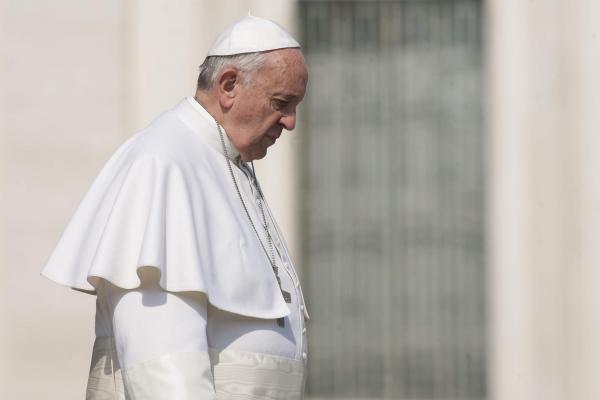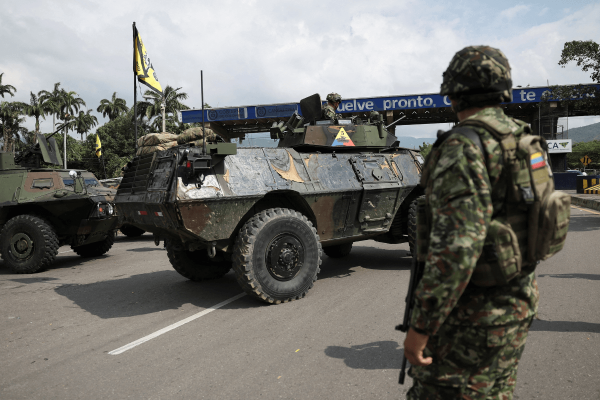During an international symposium called about nuclear weapons, Pope Francis said that the “very possession” of nuclear weapons “is to be firmly condemned.”
The symposium, called the “Prospects for a World Free of Nuclear Weapons,” was held at the Vatican on Nov. 10. I was invited to attend as a moral theologian with expertise in the ethics of war and peace, and I heard the pope say these words first hand.
This was rather different compared to his predecessors.
Previous popes, from John XXIII to Benedict XVI, have criticized nuclear weapons. But the possession of nuclear weapons as a deterrent to war was conditionally accepted by Pope John Paul II, who said in a message to the U.N. in June 1982 that the system of deterrence could be regarded as “morally acceptable” as “a step on the way toward a progressive disarmament.” Francis' immediate papal predecessor, Benedict XVI, similarly said, “What can be said, too, about those governments which count on nuclear arms as a means of ensuring the security of their countries? Along with countless persons of good will, one can state that this point of view is not only baneful but also completely fallacious.”
Pope Francis questioned deterrence as early as December 2014. As Archbishop Silvio Tomasi, who at the time represented the Holy See to the United Nations, explained, “…the use of deterrence was accepted as a condition for avoiding worst results, but not as a value in itself.” Tomasi added that not only the use but also “the possession” of nuclear weapons “is not at all acceptable.”
So the pope’s statements at the symposium this year were not shocking — the writing was already on the wall. As another speaker at the symposium, San Diego Bishop Robert McElroy, said, “The condition[s] under which there was a limited acceptance … have evaporated.” As such, the Vatican is one of three signatories to the recent U.N. “Treaty on the Prohibition of Nuclear Weapons,” which calls for the total elimination of these weapons of mass and long-term destruction.
But while the pope’s theological position is clear, what this means for lay Catholics — especially those who serve in the military, or those, like me, who pay taxes in countries possessing nuclear weapons — was a topic of much discussion among theologians, bishops, and clergy.
If a Catholic pushes a button to launch a nuclear missile, intending to kill civilian noncombatants along with military targets, that would appear to be what moral theologians refer to as formal cooperation with evil — the person performing the act does something that shares in the wrongful intent, end, or will of the principal agent’s. Such formal cooperation with evil is morally forbidden by the Catholic Church.
Most other Catholics in the military are involved less directly (and hopefully do not desire the deaths of millions of civilians from nuclear war). But these Catholic military personnel work within an institution and for a government that possesses nuclear weapons, and threatens to use them as a deterrent. For them, their work is material cooperation, which may or may not be morally licit in the eyes of the Church.
If the person does not intend the evil action but nevertheless does something without which the evil action could not have been done, then material cooperation is “immediate” and thus not morally acceptable. If the person does not approve of the evil action, and only participates indirectly and in an unessential way, through a good action — like a cook or a mechanic — then this material cooperation is “mediate” and therefore acceptable, as long as there is proportionate reason to do so (i.e., the job is needed to support one’s family).
This is where most of us Catholic U.S. citizens appear to be, by paying our taxes and going about our lives while our government and our military continue to possess and rely on nuclear weapons. Our Church seems to challenge that we have proportionate reason to do so. For now, we appear to be morally culpable — but less so if we genuinely begin to work toward the elimination of nuclear weapons.
Near the conclusion of his address, Pope Francis noted that the “teaching of John XXIII remains ever valid” in his 1963 encyclical, Pacem in Terris:
“Unless this process of disarmament be thoroughgoing and complete, and reach men’s [sic] very souls, it is impossible to stop the arms race, or to reduce armaments, or — and this is the main thing — ultimately to abolish them entirely.”
Got something to say about what you're reading? We value your feedback!







